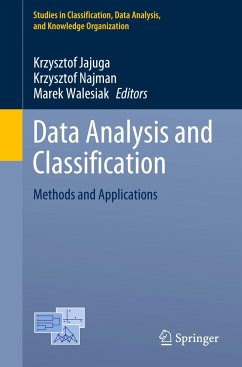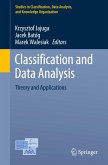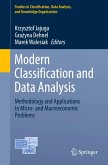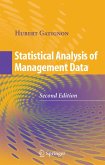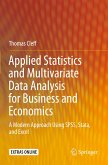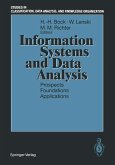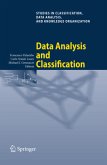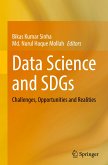Data Analysis and Classification
Methods and Applications
Herausgegeben:Jajuga, Krzysztof; Najman, Krzysztof; Walesiak, Marek
Data Analysis and Classification
Methods and Applications
Herausgegeben:Jajuga, Krzysztof; Najman, Krzysztof; Walesiak, Marek
- Broschiertes Buch
- Merkliste
- Auf die Merkliste
- Bewerten Bewerten
- Teilen
- Produkt teilen
- Produkterinnerung
- Produkterinnerung
This volume gathers peer-reviewed contributions that address a wide range of recent developments in the methodology and applications of data analysis and classification tools in micro and macroeconomic problems. The papers were originally presented at the 29th Conference of the Section on Classification and Data Analysis of the Polish Statistical Association, SKAD 2020, held in Sopot, Poland, September 7-9, 2020. Providing a balance between methodological contributions and empirical papers, the book is divided into five parts focusing on methodology, finance, economics, social issues and…mehr
Andere Kunden interessierten sich auch für
![Classification and Data Analysis Classification and Data Analysis]() Classification and Data Analysis127,99 €
Classification and Data Analysis127,99 €![Modern Classification and Data Analysis Modern Classification and Data Analysis]() Modern Classification and Data Analysis106,99 €
Modern Classification and Data Analysis106,99 €![Statistical Analysis of Management Data Statistical Analysis of Management Data]() Hubert GatignonStatistical Analysis of Management Data75,99 €
Hubert GatignonStatistical Analysis of Management Data75,99 €![Applied Statistics and Multivariate Data Analysis for Business and Economics Applied Statistics and Multivariate Data Analysis for Business and Economics]() Thomas CleffApplied Statistics and Multivariate Data Analysis for Business and Economics49,99 €
Thomas CleffApplied Statistics and Multivariate Data Analysis for Business and Economics49,99 €![Information Systems and Data Analysis Information Systems and Data Analysis]() Information Systems and Data Analysis81,99 €
Information Systems and Data Analysis81,99 €![Data Analysis and Classification Data Analysis and Classification]() Data Analysis and Classification121,99 €
Data Analysis and Classification121,99 €![Data Science and SDGs Data Science and SDGs]() Data Science and SDGs127,99 €
Data Science and SDGs127,99 €-
-
-
This volume gathers peer-reviewed contributions that address a wide range of recent developments in the methodology and applications of data analysis and classification tools in micro and macroeconomic problems. The papers were originally presented at the 29th Conference of the Section on Classification and Data Analysis of the Polish Statistical Association, SKAD 2020, held in Sopot, Poland, September 7-9, 2020. Providing a balance between methodological contributions and empirical papers, the book is divided into five parts focusing on methodology, finance, economics, social issues and applications dealing with COVID-19 data. It is aimed at a wide audience, including researchers at universities and research institutions, graduate and doctoral students, practitioners, data scientists and employees in public statistical institutions.
Produktdetails
- Produktdetails
- Studies in Classification, Data Analysis, and Knowledge Organization
- Verlag: Springer / Springer International Publishing / Springer, Berlin
- Artikelnr. des Verlages: 978-3-030-75189-0
- 1st ed. 2021
- Seitenzahl: 368
- Erscheinungstermin: 28. Juni 2021
- Englisch
- Abmessung: 235mm x 155mm x 20mm
- Gewicht: 557g
- ISBN-13: 9783030751890
- ISBN-10: 3030751899
- Artikelnr.: 61380322
- Herstellerkennzeichnung Die Herstellerinformationen sind derzeit nicht verfügbar.
- Studies in Classification, Data Analysis, and Knowledge Organization
- Verlag: Springer / Springer International Publishing / Springer, Berlin
- Artikelnr. des Verlages: 978-3-030-75189-0
- 1st ed. 2021
- Seitenzahl: 368
- Erscheinungstermin: 28. Juni 2021
- Englisch
- Abmessung: 235mm x 155mm x 20mm
- Gewicht: 557g
- ISBN-13: 9783030751890
- ISBN-10: 3030751899
- Artikelnr.: 61380322
- Herstellerkennzeichnung Die Herstellerinformationen sind derzeit nicht verfügbar.
Krzysztof Jajuga is a Professor of Finance and Statistics and Chair of the Department of Financial Investments and Risk Management at the Wroclaw University of Economics and Business, Poland. He has been a Visiting Professor at several universities in the USA, Europe and China and holds an honorary doctorate from Cracow University of Economics and an honorary professorship from Warsaw University of Technology. His scientific interests include financial econometrics and financial markets, risk analysis and management, household finance and multivariate statistics, and he is an author of numerous international and regional publications, including 18 books. Krzysztof Najman is an Associate Professor at the University of Gdäsk, Poland and Deputy Dean for Student Affairs and Education of the Faculty of Management. He is a member of the Main Council of the Polish Statistical Association and its Section of Classification and Data Analysis (SKAD). His scientific interests include cluster analysis and classification methods, artificial intelligence models, self-learning neural networks, multivariate statistical analysis, and data mining. He is an author of numerous international and regional publications, including 1 book. Marek Walesiak is a Professor of Economics, and Chair of the Department of Econometrics and Computer Science at the Wroclaw University of Economics and Business, Poland. He is a member of the Methodological Commission and the Scientific Statistical Council in Statistics Poland (GUS) and an active member of many scientific professional bodies, including the Section of Classification and Data Analysis (SKAD). His scientific interests are in classification and data analysis, composite indicators, multivariate statistical analysis, marketing research, and computational techniques in R, and he has authored numerous publications, including 11 books.
Part 1: Methodology.- Chapter 1 - Evaluation of Two-Step Spectral Clustering Algorithm for Large Untypical Data Sets (Andrzej Dudek).- Chapter 2 - Determining the Number of Groups in Cluster Analysis Using Classical Indexes and Stability Measures - Comparison of Results (Dorota Rozmus).- Chapter 3 - Identification of the Words Most Frequently Used by Different Generations of Twitter Users (Agata Majkowska, Kamila Migdal-Najman, Krzysztof Najman and Katarzyna Raca).- Chapter 4 - Classification Algorithms Applications for Information Security on the Internet: a Review (Michal Brys).- Chapter 5 - Outlier Detection with the Use of Isolation Forests (Krzysztof Najman and Krystian Zielinski).- Part 2: Application in Finance.- Chapter 6 - Propositions of Transformations of Asymmetrical Nominants into Stimulants on the Example of Chosen Financial Ratios ( Barbara Batóg and Katarzyna Wawrzyniak).- Chapter 7 - Gini Regression in The Capital Investment Risk Assessment - Sensitivity Risk Measures in Portfolio Analysis (Grazyna Trzpiot).- Part 3: Application in Economics.- Chapter 8 - Enterprise Dark Data (Katarzyna Raca).- Chapter 9 - The Significance of Medical Science Issues in Research Papers Published in the Field of Economics (Urszula Cieraszewska, Monika Hamerska, Pawel Lula and Marcela Zembura).- Chapter 10 - Application of Duration Analysis Methods in the Study of the Exit of a Real Estate Sale Offer from the Offer Database System (Ewa Putek-Szelag, Anna Gdakowicz).- Chapter 11 - Is Society Ready for Long-Term Investments? - Profiles of Electricity Users in Silesia (Sylwia Slupik and Joanna Trzesiok).- Chapter 12 - The Use of the Spatial Taxonomic Measure of Development to Assess the Tourist Attractiveness of Districts of the Lesser Poland Province(Jacek Wolak).- Part 4: Application in Social Issues.- Chapter 13 - Models of Competing Events in Assessing the Effects of the Transition of Unemployed People Between the States of Registration and De-registration (Beata Bieszk-Stolorz).- chapter 14 - Direct Adjusted Survival Probabilities in the Analysis of Finding a Job by the Unemployed Depending on Their Individual Characteristics(Wioletta Grzenda).- Chapter 15 - Europe 2020 Strategy - Objective Evaluation of Realization and Subjective Assessment by Seniors as Beneficiaries of Social Assumptions (Klaudia Przybysz, Agnieszka Stanimir and Marta Wasiak).- Chapter 16 - Do Seniors Get to the Disco by Bike or in a Taxi? - Classification of Seniors According to Their Preferred Means of Transport (Joanna Kos-Labedowicz and Joanna Trzesiok).- Part 5: Application with COVID-19 Data.- Chapter 17 - The Impact of the COVID-19 Pandemic on the Economies of European Countries in the Period January-September 2020 Based on Economic Indicators (Ewelina Nojszewska and Agata Sielska).- Chapter 18 - Modelling the Risk of Foreign Divestment in the Visegrad Group Countries During the COVID-19 Pandemic (Marcin Salamaga).- Chapter 19 - Analysis of COVID-19 Dynamics in EUCountries Using the Dynamic Time Warping Method and ARIMA Models (Joanna Landmesser).
Part 1: Methodology.- Chapter 1 - Evaluation of Two-Step Spectral Clustering Algorithm for Large Untypical Data Sets (Andrzej Dudek).- Chapter 2 - Determining the Number of Groups in Cluster Analysis Using Classical Indexes and Stability Measures - Comparison of Results (Dorota Rozmus).- Chapter 3 - Identification of the Words Most Frequently Used by Different Generations of Twitter Users (Agata Majkowska, Kamila Migdal-Najman, Krzysztof Najman and Katarzyna Raca).- Chapter 4 - Classification Algorithms Applications for Information Security on the Internet: a Review (Michal Brys).- Chapter 5 - Outlier Detection with the Use of Isolation Forests (Krzysztof Najman and Krystian Zielinski).- Part 2: Application in Finance.- Chapter 6 - Propositions of Transformations of Asymmetrical Nominants into Stimulants on the Example of Chosen Financial Ratios ( Barbara Batóg and Katarzyna Wawrzyniak).- Chapter 7 - Gini Regression in The Capital Investment Risk Assessment - Sensitivity Risk Measures in Portfolio Analysis (Grazyna Trzpiot).- Part 3: Application in Economics.- Chapter 8 - Enterprise Dark Data (Katarzyna Raca).- Chapter 9 - The Significance of Medical Science Issues in Research Papers Published in the Field of Economics (Urszula Cieraszewska, Monika Hamerska, Pawel Lula and Marcela Zembura).- Chapter 10 - Application of Duration Analysis Methods in the Study of the Exit of a Real Estate Sale Offer from the Offer Database System (Ewa Putek-Szelag, Anna Gdakowicz).- Chapter 11 - Is Society Ready for Long-Term Investments? - Profiles of Electricity Users in Silesia (Sylwia Slupik and Joanna Trzesiok).- Chapter 12 - The Use of the Spatial Taxonomic Measure of Development to Assess the Tourist Attractiveness of Districts of the Lesser Poland Province(Jacek Wolak).- Part 4: Application in Social Issues.- Chapter 13 - Models of Competing Events in Assessing the Effects of the Transition of Unemployed People Between the States of Registration and De-registration (Beata Bieszk-Stolorz).- chapter 14 - Direct Adjusted Survival Probabilities in the Analysis of Finding a Job by the Unemployed Depending on Their Individual Characteristics(Wioletta Grzenda).- Chapter 15 - Europe 2020 Strategy - Objective Evaluation of Realization and Subjective Assessment by Seniors as Beneficiaries of Social Assumptions (Klaudia Przybysz, Agnieszka Stanimir and Marta Wasiak).- Chapter 16 - Do Seniors Get to the Disco by Bike or in a Taxi? - Classification of Seniors According to Their Preferred Means of Transport (Joanna Kos-Labedowicz and Joanna Trzesiok).- Part 5: Application with COVID-19 Data.- Chapter 17 - The Impact of the COVID-19 Pandemic on the Economies of European Countries in the Period January-September 2020 Based on Economic Indicators (Ewelina Nojszewska and Agata Sielska).- Chapter 18 - Modelling the Risk of Foreign Divestment in the Visegrad Group Countries During the COVID-19 Pandemic (Marcin Salamaga).- Chapter 19 - Analysis of COVID-19 Dynamics in EUCountries Using the Dynamic Time Warping Method and ARIMA Models (Joanna Landmesser).

